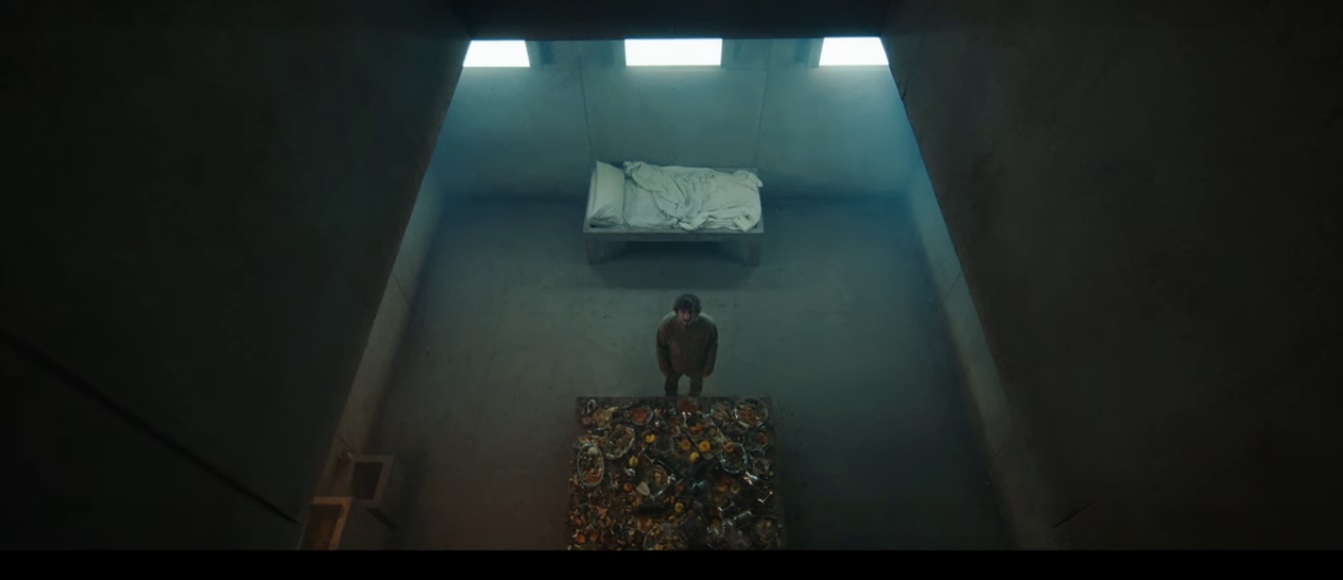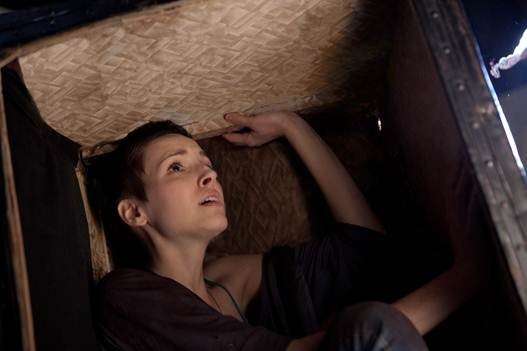Imagine a vertical prison … you know, like Warren Towers at BU. Ha. Just kidding. I’m thinking even more vertical, like each cell stacked a top one another. And the cells are large, more like living room size, each with one strange anomaly: a rectangular hole in the middle the size of a banquet table. The stacked cells are identically shaped with identical holes, identically placed in the middle of the room. From each cell you can see those above you and those below you, so long as they’re near enough to the hole. And each day, a rectangular platform the exact size of the hole descends via levitation. It starts at level one on the top and slowly marches downwards.
What is on the descending table? The daily rations for every prisoner. Oh, it’s a feast at the top, a regular Wonka world of culinary treasures. And each set of prisoners gets about three to five minutes to gorge until the food descends a level. Keeping food=punishment. Eat while it’s there or keep your trap shut. Either way, you can’t take it with you.
Goreng (Ivan Massagué) got “lucky” on his first go. His first month in the random cell rotation began at level 48. No, he won’t eat like a king, what with 90+ people (two per cell) having crack at the feast before he gets a turn, but he will eat. Past level 75 or so, just scraps are left. Past level 100, you’re lucky to see food at all. Unfortunately for him, Goreng is more crusader than survivor. We can tell by his sequestered object (every prisoner is allowed one), Miguel de Cervantes classic novel Don Quixote. His initial roommate, Trimagasi (Zorion Eguileor) is anything but a dreamer. He will happily do what he needs to survive, which probably explains his possession, a Ginsu knife.
As you might have guessed, The Platform is a prison movie in the same way that Airplane! is a film about commuting. This weird and dangerous prison is a metaphor; the film practically announces such in the opening. If you didn’t get the message from the pre-credits exposition, you’ll get it from Trimagasi, the unsympathetic metaphor for the masses – he will gorge himself silly even knowing that if he overeats people below him will get none. Similarly, he expects the people above him to behave as selfishly as he does. This is the metaphor for life: those above do not concern themselves with those below. Those below neither expect consideration from those above nor do they give any to those below them. Everybody punches down. My favorite part of this metaphor? Every month, the pecking order changes randomly. That’s life, isn’t it? Nobody has to convince me that some people deserve exactly what they have, but many do not. Life is often just a roll of the dice.
Goreng is our human conscience. He’s in prison voluntarily. He signed up to quit smoking. How about murder, Goreng? Think you can quit murder?
The Platform is bloody and uncompromising. Yeah, it lays on the metaphor a little thick, but it doesn’t pretend otherwise. Life is a pecking order; it is natural to admire those above and scorn those below. Yet, it also natural to question why we do this. And in the mean time, there are knives. This ain’t a film for everybody, and my left-leaning daughter and I argued for an hour afterwards about the meaning of the film and what role we play in society at large. The Platform is neither subtle nor forgiving, and it will stay with you a while, so make sure your stomach is able to handle it before you dive in.
A vertical jail with a hand-me-down feast
In which all denizens behave like a beast
Can’t say this design
Encourages benign
But it’s sure easy to stack the deceased
Rated TV-MA, 94 Minutes
Director: Galder Gaztelu-Urrutia
Writer: David Desola, Pedro Rivero
Genre: Political metaphor
Type of being most likely to enjoy this film: People that like to argue
Type of being least likely to enjoy this film: Pollyannas




